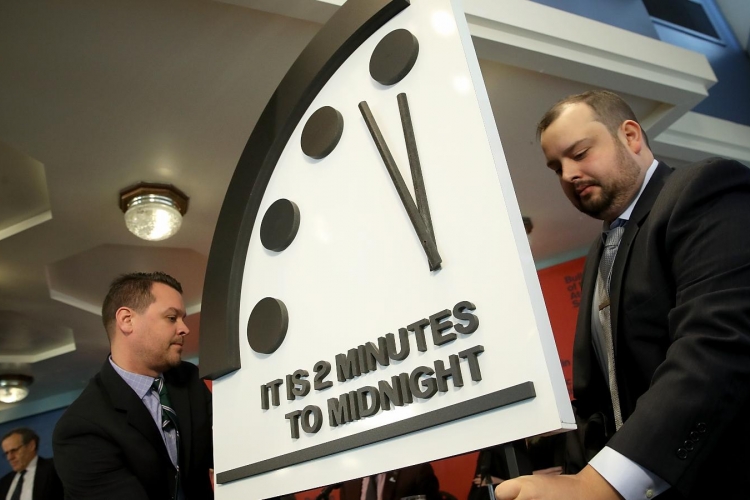INF withdrawal and consequences
In News
President Donald Trump announced on 20 October 2018 that he was withdrawing the U.S. from the treaty, citing Russian non-compliance. The U.S. formally suspended the treaty on 1 February 2019, and Russia did so the following day.
What is INF ?
The Intermediate-Range Nuclear Forces Treaty (INF Treaty, formally Treaty Between the United States of America and the Union of Soviet Socialist Republics on the Elimination of Their Intermediate-Range and Shorter-Range Missiles; Russian was a 1987 arms control agreement between the United States and the Soviet Union (and its successor state the Russian Federation) signed by President Ronald Reagan and General Secretary Mikhail Gorbachev on 8 December 1987.The INF Treaty eliminated all land-based ballistic and cruise missiles and launchers with ranges of 500–1,000 kilometers (short medium-range) and 1,000–5,500 km (intermediate-range). The treaty did not cover air- or sea-launched missiles.By May 1991, 2,692 missiles were eliminated, followed by 10 years of on-site verification inspections
Analysis
Judging by the information available about Russia's new 9M729 missiles, which violate the treaty's provisions, that is hardly surprising. Indeed, several western intelligence agencies have independently confirmed to that these weapons do indeed violate the treaty. But is abandoning the INF treaty really such a good idea?
World politics has become more volatile since US President Donald Trump assumed office.. The US and Russia’s worry to see China not bound by a new arms treaty — it is not party to any such agreement, and has been building up its military in recent years. Russia in particular feels threatened by its neighbor's military advances, which is why it is relying on land-based, medium-range missiles to project military might towards the Middle Kingdom.
The US is similarly concerned about China's growing military expenditures and capabilities.The US, like Russia, is recklessly endangering world peace and playing with fire.Everyone is talking about how climate change could bring an end to humanity. That may as well be true, but a possible new arms race between the US and Russia, alongside the new military superpower China, certainly does not make for a promising future, either.
Case of Europe
During the Cold War era, Europeans were at the mercy of both superpowers and the continent could have turned into a battlefield at any moment. We were lucky to never experience nuclear war, even though the world came precariously close during the 1962 Cuban Missile Crisis.Politicians of the cold war era cool headed, older, more rational which appear to be exceedingly rare these days. But with the INF treaty on its end, Vladimir Putin, Russia can credibly claim to feel threatened by China, it is entirely unclear why it is also aiming its medium-range missiles at Europe.
Consequences in Asia
The concerns about the development of Chinese and North Korean ballistic missile and cruise missile arsenals are bipartisan. Wishing to capitalize quickly on the withdrawal from the Treaty, the Trump Administration will undoubtedly make known in the coming months for strengthening the defence of East Asia. In addition to the reintroduction of a nuclear sea-launched cruise capability, it will decide on the merits of deploying new conventional missiles in the region.
However, while parking mobile surface-to-surface cruise missiles in Guam would be possible for long-range assets, it would require the agreement of host countries elsewhere. In Japan,it is considered that it would probably be difficult to obtain the public's consent to “offensive” US missile deployments Similarly, South Korea and the Philippines would probably be unlikely to be receptive.
India probably from lessons of past including Indo china confrontations will less likely to disturb the balance in Asia by supporting U.S interests.
For China (and probably North Korea), the withdrawal of the INF treaty validates the narrative according to which America is seeking military superiority in the region and does not accept the country's rise to power. It remains to be seen how these countries will react to a possible multiplication of offensive systems in their immediate environment especially if Russia were also to be involved.
Global disarmament treaty needed
The New Strategic Arms Reduction Treaty (New START) agreement as the only strategic nuclear disarmament deal in force today. But it expires in 2020, which will necessitate a brand new agreement to regulate the world's nuclear arsenals. By scrapping nuclear arms controls, global decision-makers are turning our world into a truly frightening place to live.. Humans are forgetful. Nations and leaders eventually forget the horrors of previous wars and then recklessly risk new bloodshed. The US and Russia urgently need to realize just how much is at stake right now.
Conclusion
-
This is not 1979.
-
The “return to normalcy” is excluded.
-
A "new treaty" is inconceivable today.
-
Deployments of new cruise missiles will increase


 IAS -2025 Prelims Combined Mains Batch - III Starts - 14-04-2024
IAS -2025 Prelims Combined Mains Batch - III Starts - 14-04-2024